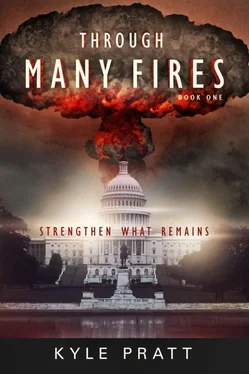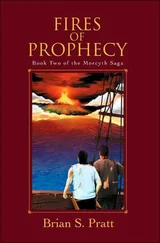That seemed reasonable. The military and government probably had control of most circuits and the few available for civilian use were probably swamped during the day. He thanked her and slipped the phone back into his pocket.
The image of his former boss, Senator Stevens, floated through his mind. Dead . He thought of the party with his co-workers he had attended that night. How many of them are dead?
The bloody face and body of Adam’s mother replaced those images and lingered momentarily until he recalled the image of his fiancée Becky on the television and the blackness that followed the Atlanta blast. How had Becky survived? How had she become press secretary for Michael Durant? President Michael Durant. The thought of her working for him made him cringe.
As the line moved slowly forward, Caden dragged his duffle bag beside him. Adam didn’t weigh much, but after an hour in line he felt like a ton. How did Maria hold him all day? He imagined putting the well-bundled child on the floor and pushing him along with his foot, but quickly dismissed the notion.
Finally, an MP once again handed Caden his unloaded pistol. He placed the weapon in his jacket pocket and walked out of the office past two soldiers with M-4s.
Returning to his thoughts, he recognized that he was glad that Becky was alive, but he desperately hoped that Maria was waiting for him outside the gate. That realization made him feel guilty, but his pace along the sidewalk quickened. As he rounded the corner and headed toward the bus stop he was nearly running. Wiping drops of cool rain from his face he scanned the group waiting for the bus. Maria was not there.
Taking shelter under a nearby tree, Caden sat on his duffle bag, turned up his collar and re-bundled Adam in his blankets. Would Maria soon be there or had she already been there? No, I went almost directly from the General’s office to the gate. Maria would think to check the security building. She must be coming. He looked around, but did not see her. He wondered if she blamed him for being arrested.
An old school bus, painted like a tie-dyed shirt, rumbled down the lane. With a bang the engine died and the bus rolled the last few feet to the stop. The side door opened and out jumped a man in bib-overalls and gray hair down to his mid-back tied in a ponytail. As he popped the hood, he called over his shoulder, “Be just a minute and we’ll head on our way south folks.”
Caden took a big whiff of the air. Why does everything smell like french-fries?
As the man worked on the engine, a woman in a long, flowery dress stepped out and hung a sign on the side of the bus. Soon she was collecting payment and allowing people onboard.
Caden remained seated as he read the sign. The trip could be paid for with canned food, various ammunition ranging from .22 caliber to shotgun shells, silver or cash. You could ride the bus for a silver quarter or sixty-five paper dollars. Caden rubbed his chin. Either they are gouging riders or inflation is soaring. He sighed. With production across the country falling inflation is probably running unchecked. At sixty-five dollars a person, cash seemed to be the most expensive, but what was the going price of silver?
In red letters across the bottom of the sign it red, “No checks or credit cards.” His gaze returned to the bus itself. It appeared to have been painted with anything that was available at the moment. Colors ranged from red to green and black. In some places it was a single color while other parts were painted with flowers and trees. Noticing the cracked windshield and at least one bald tire, he was certain the bus would never pass a DOT inspection, but he was also sure no one was bothering with inspections now. Caden had ridden similar buses while overseas in the army, but had never seen such a thing in America.
“I’ve died and gone to Woodstock.”
The voice came from behind him. In one swift motion he turned, saw it was Maria and shot to his feet.
Still in his arms Adam screamed.
Maria embraced them both.
“I was worried I wouldn’t see you again,” he said.
“I was worried too,” she replied.
“I thought you might blame me for your arrest?”
Her face registered both compassion and amusement. “Why would I do that?” She looked at the bus. “Is the bus heading toward your home?”
“Yes,” he nodded. “I have to stop in Olympia on the way and talk to Governor Monroe, but we should be home in a few hours.”
“Good. I’m beginning to feel like a gypsy.” She moved toward the bus and stopped. “Do we have $130?”
“No.” Caden rummaged through his bag and pulled out a silver dollar. “I really didn’t want to use a silver dollar for a bus ride but…well, we need the ride.”
The driver climbed onboard and started the engine.
Caden again smelled french-fries as he and Maria boarded the bus and sat in the only space available, the bench seat right behind the driver. With a shudder, the vehicle pulled away from the curb.
As the bus entered a deserted freeway, Maria asked, “How far is it to Olympia?”
“Where you going in Olympia?” the driver asked over his shoulder.
“The capitol building,” Caden replied.
“The capitol? That’s surrounded by the military.”
Maria sighed.
“It’s about 18 miles,” the driver continued as he weaved around two burned-out cars.
Holding on to the bar with one hand and the baby with the other Maria asked, “Are the regular buses not running?”
“You not from around here?”
“We recently flew into JBLM,” Caden replied.
“Oh,” he nodded. “Things started falling apart with the D.C. blast. Many people left Seattle, Tacoma and the suburbs for anywhere else, but most things continued to work until the Seattle blast. Then everyone who had stayed tried to leave—all at once.” The driver turned almost sideways in his seat. “From what I hear, power and water are mostly down in Seattle and Tacoma and the only people left are police, the military, gangs and victims. Olympia is relatively okay, but stores are sold out of most everything. What is left is either rationed or in short supply. When the buses stopped running a couple of days ago we started using our old bus to make a little money. Notice how there are no cars on the freeway.”
Caden nodded.
“No gas. Civilians can’t buy it at any price.”
“Where do you get the gas to run the bus?”
“You can modify a diesel engine to run on just about anything—even used cooking oil.” With one hand on the wheel he turned almost completely around. A broad grin spread across his face. “Smell that french-fry aroma? That’s what this is running on.”
Maria cocked her head to the side. “french-fries?”
“No,” he waved his free hand. “The vegetable oil used for cooking them.”
Across the aisle sat the woman who collected the fares. In a nonchalant voice she said, “Curve up ahead, sweetheart.”
He turned forward again, but continued to talk. “There are still a few restaurants operating in Olympia. They serve the military and political types mostly and get food from area farms. We get the vegetable oil from them after they’re done with it, filter it and use it to run our bus.”
Maria gripped the bar in front of her as the driver weaved around abandoned vehicles. “So the regular buses aren’t running?” She asked again.
“Nope. They’re barely keeping the lights on in this area.”
There were places where cars and trucks were stalled, wrecked or abandoned but, the driver explained, the police and military kept the freeway passable. Caden had driven this freeway many times as a teen and while going to college and soon he recognized the Olympia area. Minutes later the bus pulled off the freeway and down empty streets. Soldiers or military vehicles were at many of the crossroads. Some shops were open, but most were boarded up or burned out. They turned off Capitol Way onto a side street and almost at once Capitol Lake was to their right along with Heritage Park, but it wasn’t a park. It was a huge refugee camp. The capitol stood on top of a large hill before them.
Читать дальше












